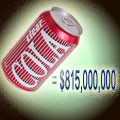- By Dan Veaner
- News
 Print
Print  With insurmountable opposition in the New York State Legislature to David Patterson's tax on sugared sodas, the Governor has announced a modified version of the tax he hopes will be more palatable to lawmakers. The new version would net $815 million per year for the State, as opposed to $1 billion estimated if the original penny-per-ounce tax had been passed.
With insurmountable opposition in the New York State Legislature to David Patterson's tax on sugared sodas, the Governor has announced a modified version of the tax he hopes will be more palatable to lawmakers. The new version would net $815 million per year for the State, as opposed to $1 billion estimated if the original penny-per-ounce tax had been passed."By implementing my modified sugar-sweetened beverage tax, we will gain an effective tool to combat obesity," Patterson wrote in a letter to New Yorkers Tuesday morning. "This plan will increase the price differential between the high sugar-high calorie and low sugar-low calorie beverages and encourage consumers to make healthier choices. A one cent per ounce excise tax would be added to sugary soft-drinks, bottled coffee and tea drinks with added sugar, powders and other sugary beverages, but my revised and improved plan will also eliminate the sales tax for bottled water and low-calorie drinks that have 10 or fewer calories per 8 oz."
By March it looked like the 'soda tax' was dead in the State Senate with all Republicans and some Democrats opposing the bill. It would have been impossible to get the 32 votes needed to pass it. Opposition in the Assembly was also high. The revised plan will yield less revenue for the State, but Patterson says it will be more effective in fighting obesity than the original proposal would have been. He outlined four key points that he hoped would sweeten the deal for lawmakers. The new version would raise an additional $370 million in 2010 and $815 million per year after that:
- The tax applied to sugar-sweetened beverages would include an excise tax of $7.68 per gallon for beverage syrups or simple syrups, and $1.28 per gallon for bottled soft drinks, powders or base product. That comes to about one penny per ounce, a gain of $465 million in 2010-11 and $1 billion in future years.
- The current tax on low-calorie soda and bottled water would be eliminated. Local governments would not be penalized because of revenue loss that would otherwise result from eliminating this sales tax. Eliminating this tax will represent a revenue loss of $100 million in 2010-11 and $195 million in future years.
- Bottled coffee and tea containing more than 10 calories per 8 ounces would be taxed. Low calorie tea and coffee drinks would not be subject to the new tax. This will add $8 million in 2010 and $15 million in future years.
- The Metropolitan Transportation Authority would not lose revenue from the revenue loss that would otherwise result from the sales tax changes. In 2010-11 this will cost $3 million, and $5 million in future years.
Patterson says that fighting obesity with the new tax will help keep health care costs down in the State.
"Obesity is associated with life threatening conditions such as heart disease, diabetes, high blood pressure and cancer, and the consumption of sugar sweetened beverages is a major contributor to obesity," he says. "These health problems and costs will only increase in the future, unless we take steps to help all New Yorkers adopt healthier lifestyles."
A recent study at the University of California in San Francisco showed that excess drinking of sugared sodas, sports drinks, and juices caused an additional 130,000 cases of diabetes between 1990 and 2000. The study found that people who had more than two sweetened drinks per day resulted in 14,000 more cases of cardiovascular disease, and estimated the cost of treating that disease at $500 billion for the decade.
Patterson's idea isn't exactly new. In 1733 sugar growers in the British West Indies lobbied the British Parliament to pass the Molasses Act, which would tax a sixpence per gallon on non-British sugar and molasses imported into the North American colonies. American Colonists found ways to get around paying the tax, mainly by smuggling and bribing customs officials. But Patterson is hoping that New Yorkers will see his point about encouraging good health, reducing health care expenses, and incidentally bring in a new revenue source to help get the State out from under its $8.2 billion deficit.
"New Yorkers spend an estimated $7.6 billion annually to treat obesity related health care costs," he wrote in his Tuesday letter. "This initiative will help lower those costs over time, and improve the health and quality of life for all New Yorkers. Now is the time for us to take bold actions, and I again urge the Legislature to help me encourage healthy eating by approving this new tax on sugar sweetened beverages."
----
v6i20



